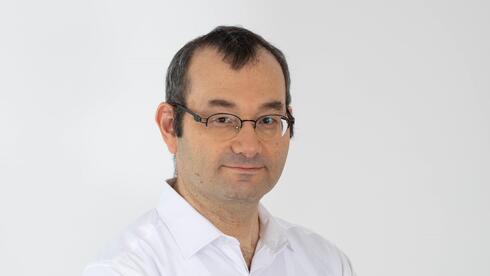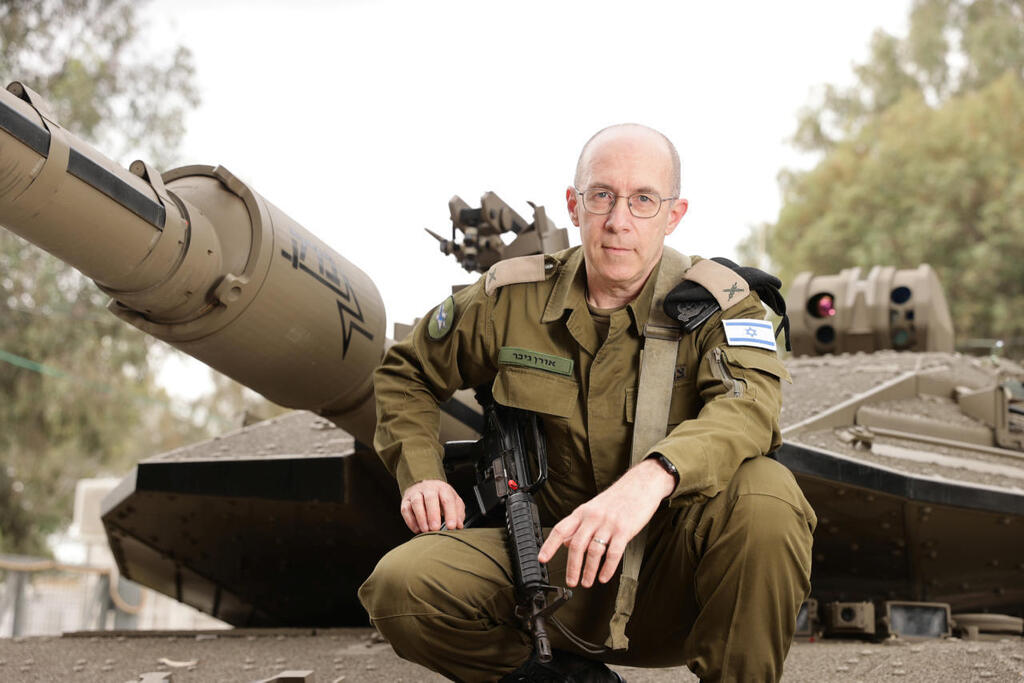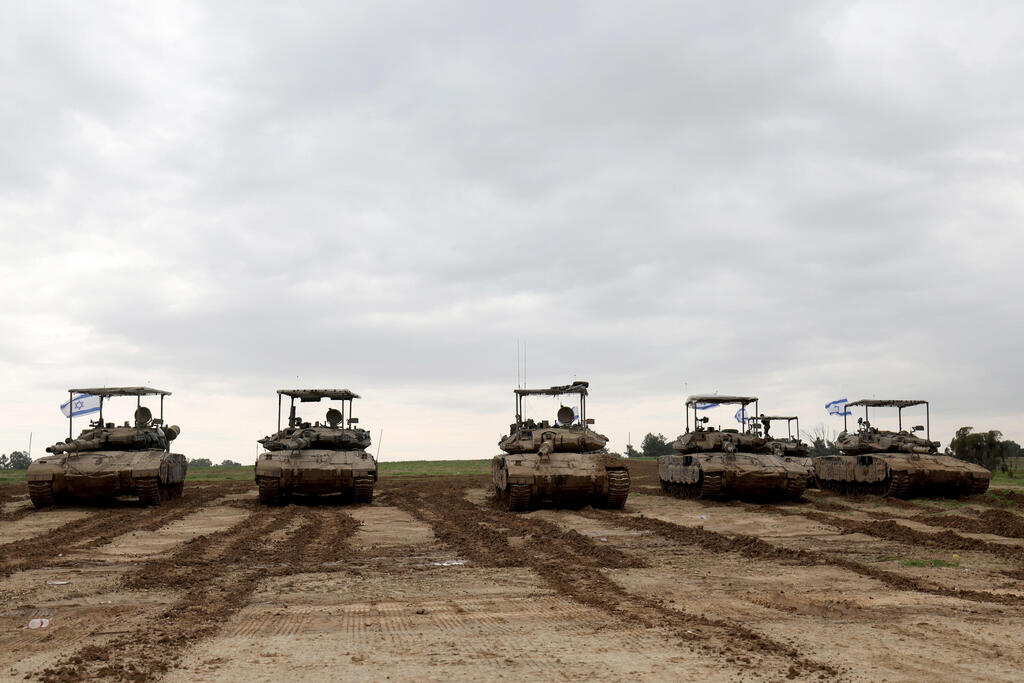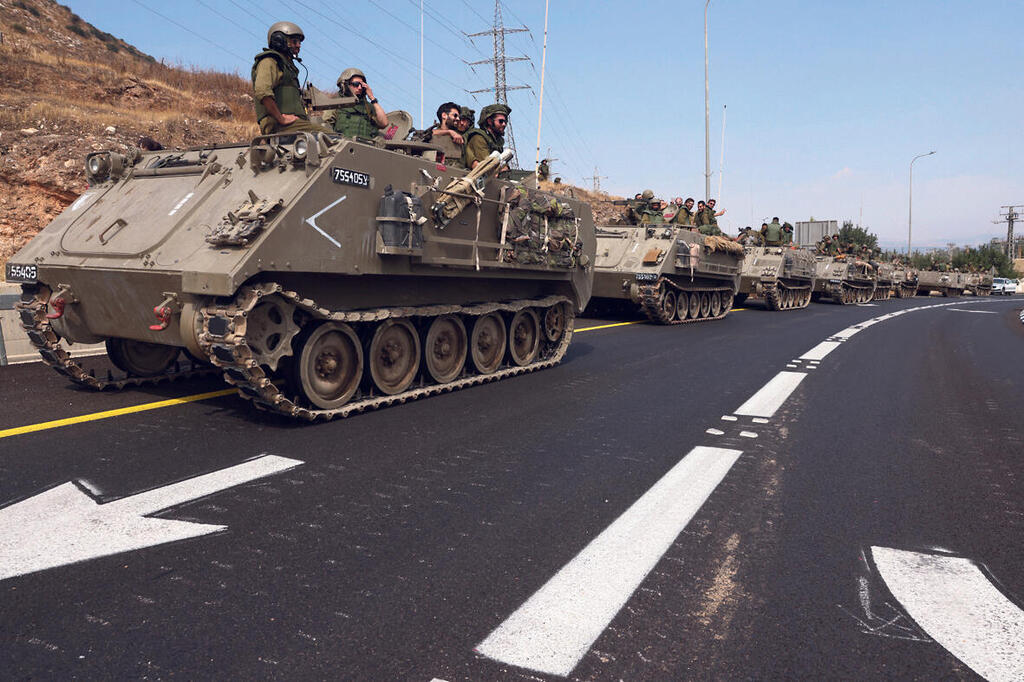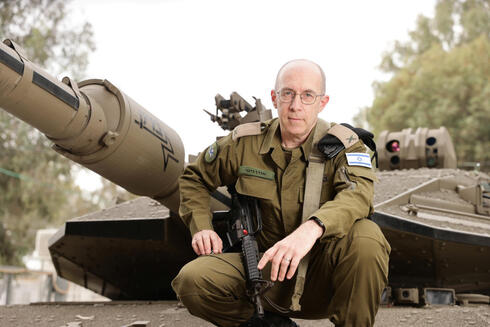
"The amount of fire directed towards Israeli forces is unlike any previous war. It shows how well-prepared Hamas was"
Brigadier General Oren Giber, head of the Ministry of Defense’s Tank and APC Directorate, spoke to Calcalist about the dramatic need for production of tanks and APCs
"Nothing from the threats we encountered in Gaza surprised us, not even their outcomes. However, the endless amount of weapons were definitely a surprise, also in terms of infrastructure strength. The amount of anti-tank missiles fired towards our forces is incomparable to any previous war we experienced. It's unlike anything we've known before. So is the enormous quantity of munitions our forces captured in the field. It shows how well-prepared Hamas was for this war," Brigadier General Oren Giber, head of the Ministry of Defense’s Tank and APC (Armored Personnel Carriers) Directorate, told Calcalist about the capabilities of Hamas in the war in Gaza.
How resistant are our tanks and APCs to fire from Gaza?
"The enemy has posed significant challenges to our armored vehicles, but fortunately has not been successful. The soldiers who operate these vehicles possess a wide and multi-layered protective shield, so there is no single defense system that we rely on. This is one of the reasons for the success of our vehicles in this arena."
What is the main method that Hamas is using to target the IDF?
"A significant part of their weaponry is RPG rockets in various forms. These are rockets operated by a terrorist with significant acquired knowledge and strategic preparation."
How is it that such relatively outdated weaponry is posing a threat to the IDF's armored vehicles?
"A large portion of these rockets have undergone adjustments for Hamas' targets. They have dual warheads, Hamas terrorists play with their activation mechanisms to target our vehicles from much shorter ranges, and thus try to challenge our defenses."
And how are the IDF's weaponry dealing with this?
"The Merkava tanks, Namer APCs, and Eitan AFVs have a very good level of protection. The ground maneuvering doesn’t stop, and the tanks operate well in the field. Fortunately, scenes from past wars like tank convoys stuck due to missile hits or tanks exploding, aren't repeating themselves. Clearly, there are fewer casualties with these vehicles, also in comparison to the Second Lebanon War."
Following the Second Lebanon War, Rafael developed the "Trophy" defense system. How well does it protect the vehicles in Gaza?
"Trophy is installed on some of the Merkava tanks, on Barak tanks, and on the Namer APCs. This year, the Iron Fist defense system will be installed on Eitan APCs, and there is an option to integrate it also on the D9 bulldozers. In both cases, Trophy and Iron Fist are very important systems and still, they constitute just one of several protective layers for the fighters in these vehicles. We decided to adapt the combat vehicles against the threats of anti-tank missiles. A tank has mobility capabilities, firepower, and defensive capabilities, and if one of these aspects is significantly higher than other aspects, it’s off balance."
How many soldiers have been killed inside tanks or APCs since the beginning of the operation?
"I won't give you these numbers as we're still at war, but I can say that every incident in which our vehicles are damaged is analyzed thoroughly. We know how many people were injured, where each of the casualties was located inside the vehicle, what caused the injury, where the injury occurred, how it occurred, and more. This analysis allows us, while fighting, to gain insights and cope better with the threats."
I assume that after the war, you and the engineers from the directorate will go back to the drawing board to address vulnerabilities exposed in battle.
"We're not waiting for after the war - we're doing it right now, during the fighting. We're making changes and adjustments according to the needs on the ground and with a forward-looking view, to new threats that may emerge."
Does this explain the metal cages on the tanks and other armored vehicles operating in the area?
"We had planned for them long before the war in Gaza. Over a year ago, we researched battles from the war between Russia and Ukraine, where the threat of drones has been dramatic. We prepared for the threat and developed cages adapted for each vehicle to protect them from armed drones. When the need arose, we moved to an industrial production process.
"At first, we built tens of cages for one type of Merkava tank, but very quickly we understood that we needed much more - for other Merkavas, APCs, Pumas and D9s. The production pace was not sufficient, and within two days, we ordered the production of very large quantities of cages. Before that, many good Israelis opened their own production lines for cages, and materials throughout the country ran out. We instructed all those dealing with cages not to purchase raw materials. We divided the tasks among them and organized them, and thus managed to produce about 20 kilometers of profiles for the cages."
The war in Gaza and the ongoing tension with Hezbollah along the northern border have led to an increase in the defense budget for 2024, which stands at an enormous and unprecedented NIS 125 billion ($34 billion). Some of this money will surely flow to the directorate. Do you have the infrastructure to support the production boom?
"We're still waiting for final decisions on this matter. Even before the war, the Chief of Staff said he sees the ground forces as part of the IDF’s broader response to the threats around us. The production infrastructure for the tanks and APCs was established in response to massive production needs."
How many of the Merkava tanks are manufactured by Israel?
"Over 70% of all components and systems of the tank are made in Israel and produced in about 200 industries across the country, 40% of which are located in the periphery, and another approximately 100 companies abroad, mainly in the United States. We make a great effort so that what we import from abroad is something that the Israeli industry cannot produce itself."
What does the expansion of tank and APC production mean for these hundreds of industries?
"It means that some of them will need to grow and expand their infrastructure. We have already mapped out all of our systems and industries that work with us, and we know exactly which ones are supposed to do what and how much they will need to expand their production capabilities. In any case, all of them will need to increase their production rates."
Many of these industries are small and medium-sized companies. Will the Ministry of Defense assist them in expanding their activity?
"Certainly. Part of the aid is provided due to the fact that the directorate works off of a multi-year budget, with the ability to enter into contractual agreements with the same companies for a period of five years ahead. The companies, especially the small ones, need certainty, and I believe we provide that. So they know in advance their profitability and how to prepare to fulfill orders. This approach also helps them negotiate better terms with suppliers and lower prices. It's a situation where everyone benefits."
Part of the manufacturing infrastructure is skilled personnel, which has been lacking for many years. Vocational education collapsed long ago. How do you deal with that?
"I'm not responsible for training the country’s technological personnel. However, there is clearly excellent technological personnel here. The directorate is an organization with high technological power, and part of that power lies in its ability to educate and train personnel in their roles."
We buy planes from the US, submarines from Germany - why does Israel need to build tanks and APCs for itself?
"It's a result of necessity. In the 1970s, no one wanted to sell tanks to Israel, and subsequently, it proved economically beneficial. Manufacturing our own APCs and tanks allows Israel to equip itself with the best-suited vehicles for its needs at almost half the cost of any other alternative. This approach also strengthens the capabilities of local industry."
The current war is also the first operational use of the Eitan APC, whose development began in response to Operation Protective Edge in Gaza in 2014. This week, special forces rescued the hostages Fernando Marman and Louis Har using such an APC.
"This APC will become the 'darling' of the army. Everyone wants it, and for now, it's only supplied to the Nahal Brigade, and there are only a few dozen of them. In some cases during the fighting, it was used for evacuating wounded and was responsible for saving the lives of no fewer than 250 wounded soldiers. During this war, these vehicles have already covered more than 35,000 kilometers with minor malfunctions. Not a single Eitan has broken down."
Unlike other APCs, the Eitan is wheeled. Doesn't it get stuck?
"When needed, we quickly replace its wheels and it continues to operate. The Eitan has proven that it can move even if all its wheels are punctured and can reach very high speeds."
One cannot ignore the fact that the army still has thousands of outdated 113-M APCs, whose protection level is inferior. This reminds me of the military’s huge weapons expansion after the Yom Kippur War. In 50 years, will they speak about the excessive weapons expansion after October 7, 2023?
"Our ground forces today are characterized by such significant gaps compared to the need, so there's much to do before we find ourselves in a situation like the one you described."
Just weeks before the war, the Ministry of Defense was still promoting a historic export plan for outdated Merkava 2 and 3 tanks. Following the war, the Director-General of the Ministry of Defense, Major General Eyal Zamir, ordered to keep these vehicles, so it seems that the dream of exporting Israeli tanks has faded.
"There are many wars in the world, and everyone is looking for tanks. What the IDF considers an outdated tank may not necessarily be unsuitable for the needs of other armies. While in the world tanks fight against tanks, here our tanks fight against anti-tank missiles, and we are mainly focused on this threat. The debate is about what to do with such vehicles once the IDF has decided it doesn't want them. If the options are between scrapping the outdated tanks or selling them, I am in favor of selling them as long as there is a buyer."





